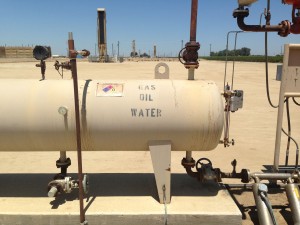
By Andrew Grinberg, California Oil and Gas Manager - Follow Andrew on Twitter (@AndrewBGrinberg)
Last week, the Legislature and Governor Brown agreed to a new California budget. How our state will spend $115 billion in 2015-16 is a big deal. It has major implications for our environment and water supply, especially in the midst of the drought. In addition to where the money goes, the budget includes direction on how the state spends its money. In many cases these directives amount to key policy decisions that reach well beyond their fiscal impacts.
The new budget addresses some of Clean Water Action's top priority issues. Over the next few days we will highlight two of our biggest victories in the budget: providing public access to existing groundwater data, and protecting water quality from the oil industry.
Today, we highlight budget victories that will help protect water from oil and gas industry pollution.
Over the last year, the State's failure to oversee oil and gas wastewater disposal practices has been well documented. From illegal dumping into open pits to irrigating of crops with harmful chemicals the oil and gas industry has put our health and water supply at risk. The state's biggest failure, however, has been the illegal permitting of thousands of wells that are now injecting oil and gas waste and other fluids into potential sources of drinking water. Clean Water Action has been working to turn around California’s Underground Injection Control (UIC) program from a failed scheme allowing oil companies to pollute aquifers to one that actually protects drinking water.
One way to fix this mess would be to have a more responsible agency at the helm, funded to do its job adequately. To this end, we have called for water quality experts at the State Water Resources Control Board be more involved in regulating the oil and gas industry, and to take a lead role in important decisions about where, how, and if toxic chemicals can be injected underground. Leaving oil and gas oversight to the Division of Oil, Gas and Geothermal Resources (DOGGR) has resulted in decades of lax oversight and rubber stamping of permits that has favored industry and put our drinking and irrigation water at risk.
The budget included 3 key victories that will help the Water Board do its job, and protect our water from oil and gas industry pollution.
The referenced media source is missing and needs to be re-embedded.
Photo: Andrew Grinberg- The Water Board will now have to review and concur with all aquifer exemption applications that oil companies bring to the state. With over 6,000 injection wells (a mix of wastewater disposal and enhanced oil recovery wells) currently operating outside of exempt aquifers, there will be a massive rush by California oil producers to gain new exemptions. Clearly defining the Water Board's role in the exemption process will be key to ensuring that potentially useable groundwater will be protected.
- The Water Board will also be able to fund its oversight of oil and gas activities from the per barrel fee (currently just 28 cents for every barrel of oil produced in California) that oil companies pay to the state. This means that cracking down on polluting oil companies won't cost taxpayers a dime.
- Beginning in 2018, the State will convene an independent panel to review DOGGR's implementation of the UIC program and to determine whether the program should be transferred to the Water Board. We have advocated for years for the Water Board to be the lead agency on more oil field regulations. This review will potentially set off a major shift in how underground injection is regulated; a transfer of this program would mean a shift from rubber stamping permits at the will of the industry, to prioritizing water quality for all injection projects.
Related Posts
Stay Informed
Get the latest updates and actions:
Thanks for signing up!
There was a problem processing your signup. Please try again.


